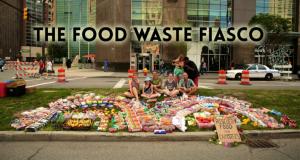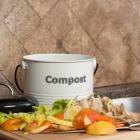Reducing your “foodprint”
Submitted by Andrew Lee on | Updated Wed, 25/10/2017 - 16:30

Food is probably the most carbon intensive of our basic needs. Consider the time and care required to grow food in our gardens and on our farms, that nourish us as humans.
Now add in all of the indirect processes from farm to table: crops diverted to feed the animals we eat, fossil fuel inputs such as fertilizers and transportation, food packaging, deforestation, cow farts... finally, consider globalization’s impact - today’s industrial food complex is now making available endless varieties of food from all corners of the globe, satisfying our never ending appetite for non-local, out-of-season exotic fruits and vegetables.
It’s no wonder that “the entire food industry is responsible for one third of all human caused greenhouse gas emissions” according to nature.com [1]. The same article propounds that, ironically, by 2050 global warming could cause crop reductions of 13% in wheat and 15% in irrigated rice in developing countries.
Our day-to-day decisions revolving around what we eat and where we buy it have a large impact on our carbon footprint. These decisions also have far reaching impacts on our health, the well being of farmers, and the environment, from our forests to our water systems, across the globe.
Here are some of the things I have done and which you can do to reduce your foodprint. Let’s start with the supermarket.
Reduce or eliminate food packaging. Bring reusable bags or cardboard boxes. Don’t bag every single kind of produce (I combine different types of vegetables into one bag after checkout), and opt for foods that don’t come in packaging. Grocery chains, such as Original Unverpackt in Germany and In.gredients in Austin, Texas, are opening up which aim to be completely free of packaging and plastic [2].
Drink less bottled water. Unless your local well or stream has been contaminated by hydraulic fracturing or other industrial processes, you have no excuse to drink bottled water, except out of convenience, also called laziness. Bottled water creates plastic waste, destroys stream environments, costs 1,000 times more than tap water, and is less healthy than tap water because it is subject to less stringent regulations. Besides, many bottled water companies such as Nestle, are filling their bottles with tap water, anyway.
Need any more reasons? Taste tests have proven that people prefer the taste of tap water over bottled water. On my own personal quest to reduce my foodprint, I have gone without bottled water nearly 5 years, with few exceptions due to emergencies.
Buy organic. It may be more expensive, but conventional produce comes with many hidden costs to the environment. For example, conventional produce is grown using external inputs such as synthetic fertilizers and pesticides. In the UK the use of these chemicals creates 0.7 tonnes per person of carbon out of 2.2 tonnes per person equivalent. This means that a British citizen eating conventional produce for one year produces 0.7 tonnes of carbon emissions in pesticide use alone [3]. And that’s excluding wider ranging impacts of pesticide use such as soil degradation, biodiversity loss, and contamination of watersheds, which exacerbate its carbon footprint. The complexity of agriculture makes it hard to measure the carbon impact of varying strategies, however, some studies have shown organic dairy and grain to produce at least 20% less carbon emissions than conventional [4]. Buying organic equates to buying in-season, ethically and locally. Imagine buying apples from New Zealand? Consider that 20% of all air transport, by far the most polluting form of transportation, is dedicated to moving food [5].
Eat less meat. The single change that any individual can make, in any facet of their lives, to reduce their carbon footprint is to reduce their meat consumption. The meat industry is responsible for 51% of all global greenhouse emissions, as well as 55% of total water consumption [6] according to the documentary Cowspiracy. The documentary also calls out the lack of media exposure around this fact. The truth is, it is the most unsettling truth of all, a truth which goes against possibly our most ingrained cultural activity - eating meat. A meat lover’s diet results in 3.3 tons of carbon dioxide equivalent. Switching to a plant based diet, which produces 1.5 tons of carbon dioxide equivalent, reduces emissions by over half [7]. And the vegan culture that exists today proves that it is viable and healthy. While I haven’t gone vegan, I have managed to reduce my meat consumption to nearly none, only eating it when offered by others.
Eliminate food waste! Up to 40% of food is wasted in the process from farm to table, and the average American family throws away up to $600 of food every year [8]. As a consumer, make more frequent, smaller shopping trips to ensure that you get the fresh produce you need, and when you need it. Avoid bulk food shopping, which often results in buying more food than needed causing some to spoil. Note that the “Best Before” date does not imply when the food will spoil, only when it’s past its optimal freshness. I often eat food past the Best Before date and it still tastes fresh. In the restaurants, get it to go. I sometimes bring tupperware with me to restaurants in anticipation of this.
Finally, one taboo method of eliminating food waste is to dumpster dive! I did this when I lived in Vancouver. Two filmmakers claimed to dumpster dive in Vancouver for 6 months, salvaging up to $20,000 worth of food! Their documentary is called “Just Eat it! A Food Waste Story” [9]. Activist Rob Greenfield, as seen in the article image, cycled across America and got 70% of his food from dumpsters!
Avoid foods which cause deforestation. Deforestation, mainly for conversion to agricultural land use - particularly cattle, soy and palm oil - is responsible for most of land emissions. Land emissions makes up 13% of global greenhouse gas emissions [7].
Grow your own food! It’s time for us to empower ourselves by growing our own food. For every pound of garden vegetables you grow yourself, you save 2 lbs or about 1 kg of carbon emissions. [10] Not only that but you take control of your health and well being.
[1] http://www.nature.com/news/one-third-of-our-greenhouse-gas-emissions-come-from-agriculture-1.11708
[2] http://www.theplaidzebra.com/zero-waste-grocery-store-no-packaging-plastic-big-name-brands/ and http://www.canadiangrocer.com/worth-reading/inside-a-zero-waste-package-...
[3] http://www.carbonindependent.org/sources_food.html
[4] http://www.davidsuzuki.org/what-you-can-do/food-and-our-planet/food-and-...
[5] https://en.wikipedia.org/wiki/Food_miles
[6] http://www.cowspiracy.com/infographic/
[7] http://shrinkthatfootprint.com/shrink-your-food-footprint
[8] http://abcnews.go.com/2020/Health/story?id=1407046
[10] http://www.carbonrally.com/challenges/33-organic-gardening
You will save the Earth by sharing and/or tweeting (corny right?)





